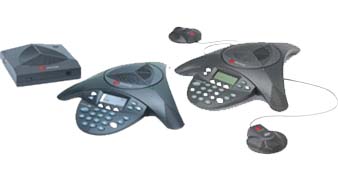Audio Conferencing

An introduction to Conference Telephones
The main purpose of conference telephones is to enable easy conversation between more than two people via a single telephone unit. The problems that arise from using just one telephone can be exemplified by picturing the scene of a party of people huddling round a receiver to sing happy birthday to the person on the other end. When put into arena of the modern office, it is obvious why this scene would be unacceptable for holding a conference and why conference telephones are an obvious development of the telephone.
How Conference Telephones Work
Standard conference telephones are made up of microphones and speakers that can broadcast voices and other noise in the same way that a speakerphone does. Conference Telephones are designed in such a way so that a group of people can easily speak and listen to callers without the need of having to be in close proximity of the telephone unit as a person would if using a speakerphone or telephone handset.
Conference telephones usually consist of a portable unit that contains the speakers and microphones and connects to a standard phone line. This unit is placed in the middle of the conference room to enable consistent sound clarity from any point in the room. Additional microphones can be added to most conference telephones to improve the clarity of all voices in the room.
Conference Telephones Sound Quality
Unlike most speakerphones which operate in way that mutes the speaker whenever the microphone is activated, conference telephones allow both parties to speak and listen to each other simultaneously through the use of digital signal processors.
This way feedback is prevented while also avoiding the need to cut out the voice of the remote recipient in the way that standard speakerphones tend to. This method of allowing users to speak simultaneously is known as working in “full duplex” mode.
Choosing Conference Telephones
There are three factors to take into account when looking to buy conference telephones; compatibility; sound quality and office setting.
Compatibility
Ensure that your conference telephone equipment integrates with your existing telephone system set-up. If your company’s telephone system is based around digital technology and your chosen conference telephones are analogue, you must employ an adapter to connect the systems together.
Sound Quality
Full-Duplex mode is essential for an effective conference telephone system. Most conference telephones are full-duplex, but do check the quality of the full-duplex mode as this can vary. A good way to check the effectiveness of the sound quality is to have two people read the same passage of text over a conference telephone connection. If the conference telephones are good, you should be able to clearly hear both participants without experiencing any cut off of either speaker.
Office Setting
Check your conference telephones in the environment where they will be used. This will ensure that you know that the speaker volume and clarity is acceptable and that the microphone can receive the voices of all participants. If the conference telephones are to be used in a number of rooms of different sizes, it will be worth looking at models that have expansion capabilities.
